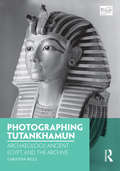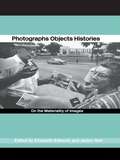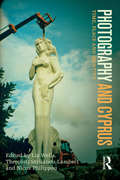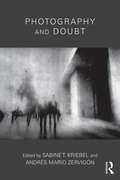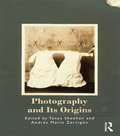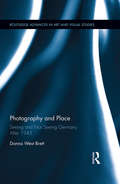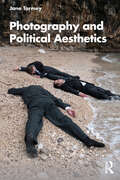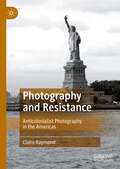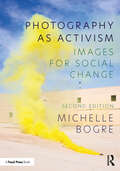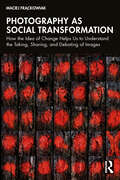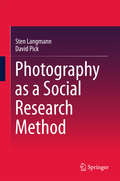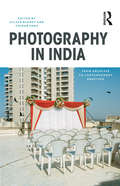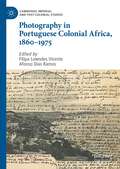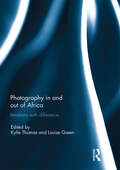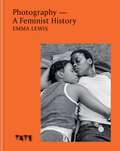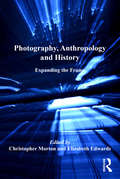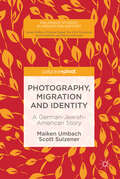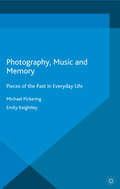- Table View
- List View
Photographing Tutankhamun: Archaeology, Ancient Egypt, and the Archive (Photography, History: History, Photography)
by Christina RiggsThey are among the most famous and compelling photographs ever made in archaeology: Howard Carter kneeling before the burial shrines of Tutankhamun; life-size statues of the boy king on guard beside a doorway, tantalizingly sealed, in his tomb; or a solid gold coffin still draped with flowers cut more than 3,300 years ago. Yet until now, no study has explored the ways in which photography helped mythologize the tomb of Tutankhamun, nor the role photography played in shaping archaeological methods and interpretations, both in and beyond the field. This book undertakes the first critical analysis of the photographic archive formed during the ten-year clearance of the tomb, and in doing so explores the interface between photography and archaeology at a pivotal time for both. Photographing Tutankhamun foregrounds photography as a material, technical, and social process in early 20th-century archaeology, in order to question how the photograph made and remade ‘ancient Egypt’ in the waning age of colonial order.
Photographs Objects Histories: On the Materiality of Images
by Elizabeth Edwards Janice HartThis innovative volume explores the idea that while photographs are images, they are also objects, and this materiality is integral to their meaning and use. The case studies presented focus on photographs active in different institutional, political, religious and domestic spheres, where physical properties, the nature of their use and the cultural formations in which they function make their 'objectness' central to how we should understand them.The book's contributions are drawn from disciplines including the history of photography, visual anthropology and art history, with case studies from a range of countries such as the Netherlands, North America, Australia, Japan, Romania and Tibet. Each shows the methodological strategies they have developed in order to fully exploit the idea of the materiality of photographic images.
Photography
by Stephen BullPhotography explores the photograph in the twenty-first century and its importance as a media form. Stephen Bull considers our media-saturated society and the place of photography in everyday life, introducing the theories used to analyse photographs and exploring the impact of digital technology. The text is split into short, accessible chapters on the broad themes central to the study and analysis of photography, and key issues are explained and applied to visual examples in each chapter. Topics covered include: the identity of photography the meanings of photographs photography for sale snapshots the photograph as document photography as art photographs in fashion photography and celebrity. Photography is an up-to-date, clear and comprehensive introduction to debates about photography now and is particularly useful to media, photography and visual culture students.
Photography Reframed: New Visions in Contemporary Photographic Culture (International Library Of Visual Culture Ser.)
by Ben BurbridgeAt a critical point in the development of photography, this book offers an engaging, detailed and far-reaching examination of the key issues that are defining contemporary photographic culture. Photography Reframed addresses the impact of radical technological, social and political change across a diverse set of photographic territories: the ontology of photography; the impact of mass photographic practice; the public display of intimate life; the current state of documentary, and the political possibilities of photographic culture. These lively, accessible essays by some of the best writers in photography together go deep into the most up-to-date frameworks for analysing and understanding photographic culture and shedding light on its histories. Photography Reframed is a vital road map for anyone interested in what photography has been, what it has become, and where it is going.
Photography Theory (The Art Seminar)
by Jame ElkinsPhotography Theory presents forty of the world's most active art historians and theorists, including Victor Burgin, Joel Snyder, Rosalind Krauss, Alan Trachtenberg, Geoffrey Batchen, Carol Squiers, Margaret Iversen and Abigail Solomon-Godeau in animated debate on the nature of photography. Photography has been around for nearly two centuries, but we are no closer to understanding what it is. For some people, a photograph is an optically accurate impression of the world, for others, it is mainly a way of remembering people and places. Some view it as a sign of bourgeois life, a kind of addiction of the middle class, whilst others see it as a troublesome interloper that has confused people's ideas of reality and fine art to the point that they have difficulty even defining what a photograph is. For some, the whole question of finding photography's nature is itself misguided from the beginning. This provocative second volume in the Routledge The Art Seminar series presents not one but many answers to the question what makes a photograph a photograph?
Photography and Cyprus: Time, Place and Identity (Int. Lib. Of Modern And Contemporary Art Ser.)
by Liz WellsFormerly a British colony, the island of Cyprus is now a divided country, where histories of political and cultural conflicts, as well as competing identities, are still contested. Cyprus provides the ideal case study for this innovative exploration, extensively illustrated, of how the practice of photography in relation to its political, cultural and economic contexts both contributes and responds to the formation of identity. Contributors from Cyprus, Greece, the UK and the USA, representing diverse disciplines, draw from photography theory, art history, anthropology and sociology to explore how the island and its people have been represented photographically. They reveal how the different gazes- colonial, political, gendered, and within art photography- contribute to the creation of individual and national identities and, by extension, to the creation and re-creation of imagery of Cyprus as place. While Photography and Cyprus focuses on one geographical and cultural territory, the questions this book asks and the themes and arguments it follows apply also to other places characterized by their colonial heritage. The intriguing example of Cyprus thus serves as a fitting test-ground for current debates relating to photography, place and identity.
Photography and Doubt
by Sabine T. Kriebel Andrés Mario ZervigónRecent decades have seen photography’s privileged relationship to the real come under question. Spurred by the postmodern critique of photography in the 1980s and the rise of digital technologies soon thereafter, scholars have been asking who and what built this understanding of the medium in the first place. Photography and Doubt reflects on this interest in photography’s referential power by discussing it in rigorously historical terms. How was the understanding of photographic realism cultivated in the first place? What do cases of staged and manipulated photography reveal about that realism’s hold on audiences across the medium’s history? Have doubts about photography’s testimonial power stimulated as much knowledge as its realism? Edited by Sabine T. Kriebel and Andrés Mario Zervigón, Photography and Doubt is the first multi-authored collection specifically designed to explore these questions. Its 13 original essays, illustrated with 73 color images, explore cases when the link between the photographic image and its referent was placed under stress, and when photography was as attuned to its myth-making capabilities as to its claims to authenticity. Photography and Doubt will serve as a valuable resource for students and scholars in art history, visual and media studies, philosophy, and the history of science and technology.
Photography and Its Origins
by Tanya Sheehan Andres ZervigonRecent decades have seen a flourishing interest in and speculation about the origins of photography. Spurred by rediscoveries of ‘first’ photographs and proclamations of photography’s death in the digital age, scholars have been rethinking who and what invented the medium. Photography and Its Origins reflects on this interest in photography’s beginnings by reframing it in critical and specifically historiographical terms. How and why do we write about the origins of the medium? Whom or what do we rely on to construct those narratives? What’s at stake in choosing to tell stories of photography’s genesis in one way or another? And what kind of work can those stories do? Edited by Tanya Sheehan and Andrés Mario Zervigón, this collection of 16 original essays, illustrated with 32 colour images, showcases prominent and emerging voices in the field of photography studies. Their research cuts across disciplines and methodologies, shedding new light on old questions about histories and their writing. Photography and Its Origins will serve as a valuable resource for students and scholars in art history, visual and media studies, and the history of science and technology.
Photography and Jewish History: Five Twentieth-Century Cases (Jewish Culture and Contexts)
by Amos Morris-ReichIt is a sign of the accepted evidentiary status of photographs that historians regularly append them to their accounts, Amos Morris-Reich observes. Very often, however, these photographs are treated as mere illustrations, simple documentations of the events that transpired. Scholars of photography, on the other hand, tend to prioritize the photographs themselves, relegating the historical contexts to the background. For Morris-Reich, however, photography exists within reality; it partakes in and is very much a component of the history it records. Morris-Reich examines how photography affects categories of history and experience, how it is influenced by them, and the ways in which our understanding of the relationship between history and photography can be theorized and reoriented.Morris-Reich here turns to five twentieth-century cases in which photography and Jewish history intersect: Albert Kahn’s utopian attempt to establish a photographic archive in Paris in order to advance world peace; the spectacular failed project of Helmar Lerski, the most prominent photographer in British Mandate Jewish Palestine; photography in the long career of Eugen Fischer, a Nazi professor of genetics; the street photography of Robert Frank; and the first attempt to introduce photography into the study of Russian Jewry prior to World War I, as seen from the post-Holocaust perspective of the early twenty-first century. Illustrated with nearly 100 images, Photography and Jewish History moves beyond a focus on Jewish photographers or the photographic representation of Jews or Jewish visibility to plumb the deeper and more significant registers of twentieth-century Jewish political history.
Photography and Migration
by Tanya SheehanWritten in the context of unprecedented dislocation and a global refugee crisis, this edited volume thinks through photography’s long and complex relationship to human migration. While contemporary media images largely frame migration in terms of trauma, victimhood, and pity, so much more can be said of photography’s role in the movement of people around the world. Cameras can document, enable, or control human movement across geographical, cultural, and political divides. Their operators put faces on forced and voluntary migrations, making visible hardships and suffering as well as opportunity and optimism. Photographers include migrating subjects who take pictures for their own consumption, not for international recognition. And photographs themselves migrate with their makers, subjects, and viewers, as the very concept of photography takes on new functions and meanings. Photography and Migration places into conversation media images and other photographs that the contributors have witnessed, collected, or created through their diverse national, regional, and local contexts. Developed across thirteen chapters, this conversation encompasses images, histories, and testimonies offering analysis of new perspectives on photography and migration today.
Photography and Place: Seeing and Not Seeing Germany After 1945 (Routledge Advances in Art and Visual Studies)
by Donna West BrettAs a recording device, photography plays a unique role in how we remember places and events that happened there. This includes recording events as they happen, or recording places where something occurred before the photograph was taken, commonly referred to as aftermath photography. This book presents a theoretical and historical analysis of German photography of place after 1945. It analyses how major historical ruptures in twentieth-century Germany and associated places of trauma, memory and history affected the visual field and the circumstances of looking. These ruptures are used to generate a new reading of postwar German photography of place. The analysis includes original research on world-renowned German photographers such as Thomas Struth, Thomas Demand, Michael Schmidt, Boris Becker and Thomas Ruff as well as photographers largely unknown in the Anglophone world.
Photography and Political Aesthetics
by Jane TormeyThis accessible book explores the creative uses of photography with political purpose, both in terms of subject matter and of the political perspectives that have driven attitudes to viewing photographs. The shorter Part I reviews twentieth-century thinking that has influenced attitudes to photography and the political. Part II identifies the political ideas that drive practical strategies in the twenty-first century. It considers the politics of photography by looking at what affects people’s lives and agency: attitudes to difference and identity; power relations between institutions, individuals, and communities; the impact of trauma and global change. With a focus on the exchange of ideas between visual practice and theories, a selection of projects are examined from a range of perspectives, such as post-colonial and feminist thinking, post-humanism, and cultural and social theory, with references ranging from Michel Foucault and Judith Butler to Achille Mbembe, Bruno Latour, and Chantal Mouffe. The pursuit of ‘political aesthetics’ borrows from Jacques Rancière’s ideas about cultural production. Photography and Political Aesthetics identifies photography as politically productive when positioned within political movements, and champions practices that perform, investigate, or give attention to presentation and public dissemination. This book is ideally suited to students studying photography, art and aesthetics, visual politics, and cultural studies, and researchers across the fields of photography, media, art, and politics.
Photography and Resistance: Anticolonialist Photography in the Americas
by Claire RaymondThis book argues that photography, with its inherent connection to the embodied material world and its ease of transmissibility, operates as an implicitly political medium. It makes the case that the right to see is fundamental to the right to be. Limning the paradoxical links between photography as a medium and the conditions of political, social, and epistemological disappearance, the book interprets works by African American, Indigenous American, Latinx, and Asian American photographers as acts of political activism in the contemporary idiom. Placing photographic praxis at the crux of 21st-century crises of political equity and sociality, the book uncovers the discursive visual movements through which photography enacts reappearances, bringing to visibility erased and elided histories in the Americas. Artists discussed in-depth include Shelley Niro, Carrie Mae Weems, Paula Luttringer, LaToya Ruby Frazier, Matika Wilbur, Martine Gutiérrez, Ana Mendieta, An-My Lê, and Rebecca Belmore. The book makes visible the American land as a site of contestation, an as-yet not fully recognized battlefield.
Photography as Activism: Images for Social Change
by Michelle BogreThis fully revised and updated second edition of Photography as Activism is both a study of activist photography, and a call to action. It offers students and documentary photographers insights into the theory, history, philosophy, and practice of photography as activism.The book is lavishly illustrated with 85 key historical and contemporary images. Chapters have been revised to include contemporary ideas about representation, gaze, agency, and decolonizing the camera, as well as an expanded history that includes work from the global South and the civil rights movements in the US. A new fourth chapter focuses on activist practices that go beyond traditional reportage. It features 19 new interviews and updates on the original interviews. Photographers talk about their practices, the challenges they face in the twenty-first century, advice on working with NGOs and non-profits, and how to form partnerships to expand the dissemination of their work.Photography as Activism is an essential text for courses on documentary and photojournalism, and those that explore art as social change more broadly, but also a call to action for young photographers to pick up their cameras and advocate for change.
Photography as Social Transformation: How the Idea of Change Helps Us to Understand the Taking, Sharing, and Debating of Images
by Maciej FrąckowiakPhotography as Social Transformation resituates the practices of photography within contemporary sociological thinking. It examines how photography influences and shapes social order in the social media age and offers a methodological framework for studying transformation, revealing the forms the process can take and the settings in which it occurs.Photography and the transformation it effects is conceptualised using actor-network theory, allowing it to be effectively studied in the context of globalisation and the rapid spread of mobile devices. Going beyond consideration of the images themselves, Maciej Frąckowiak analyses the rituals and devices used to take them, the networks in which they circulate, conversations about them, and institutional attempts to regulate their content. More than ‘dead paper’ or a digital file or a visual representation, Photography as Social Transformation shows how photography is a complex social phenomenon, causal and capable of producing change.Offering case studies from around the world and drawing on a range of sources, giving priority to media coverage from specialised and popular venues, Photography as Social Transformation is for students and scholars of the sociology of media, visual sociology, photographic methods in research, media and communications, cultural studies, and photography theory.
Photography as a Social Research Method
by Sten Langmann David PickThis book focuses on photography within the social research field, building a solid foundation for photography as a social research method and describing different techniques and applications of photo research. It provides a comprehensive approach to research photography, from preparation and the ethical considerations that need to be understood prior to going into the field, to collecting data, analysis and preparing research for publication. It also introduces artistic genres of photography to help readers with the choices they make when pursuing photographic research and as a reminder that when collecting photographs that they are in fact producing art. The ethical issues examined place a new focus on dignity and considerations of participant anonymity and recognition, informed consent, working with vulnerable groups, unequal power relationships and possible intervention. Combining preparation and ethics, it examines how best to collect and take good photographs, and explores the practical issues of stigma and introduces Verstaendnis (german: understanding) to aid researchers in the field. Subsequently, the book discusses the different photo-analytical approaches for researchers and provides examples of how to analyse photographs using the different techniques. Lastly, it offers guidelines, with examples, for researchers wanting to publish their work.
Photography for Everyone: The Cultural Lives of Cameras and Consumers in Early Twentieth-Century Japan
by Kerry RossThe Japanese passion for photography is almost a cliché, but how did it begin? Although Japanese art photography has been widely studied this book is the first to demonstrate how photography became an everyday activity. Japan's enthusiasm for photography emerged alongside a retail and consumer revolution that marketed products and activities that fit into a modern, tasteful, middle-class lifestyle. Kerry Ross examines the magazines and merchandise promoted to ordinary Japanese people in the early twentieth century that allowed Japanese consumers to participate in that lifestyle, and gave them a powerful tool to define its contours. Each chapter discusses a different facet of this phenomenon, from the revolution in retail camera shops, to the blizzard of socially constructive how-to manuals, and to the vocabulary of popular aesthetics that developed from enthusiasts sharing photos. Ross looks at the quotidian activities that went into the entire picture-making process, activities not typically understood as photographic in nature, such as shopping for a camera, reading photography magazines, and even preserving one's pictures in albums. These very activities, promoted and sponsored by the industry, embedded the camera in everyday life as both a consumer object and a technology for understanding modernity, making it the irresistible enterprise that Eastman encountered in his first visit to Japan in 1920 when he remarked that the Japanese people were "almost as addicted to the Kodak habit as ourselves."
Photography in India: From Archives to Contemporary Practice
by Aileen BlaneyPhotography’s prominence in the representation and experience of India in contemporary and historical times has not guaranteed it a position of sustained attention in research and scholarship. For a technology as all pervasive as photography, and a country as colossal as India, this scenario is somewhat of an anomaly. Photography in India explores elements of the past, present and future of photography in the context of India through speculation and reflection on photography as an artistic, documentary and everyday practice. The perspectives of writers, theorists, curators and artists are selectively brought to bear upon known as well as previously unseen photographic archives, together with changes in photographic practice that have been synchronous with contemporary India’s rapid urban and rural transformation and the technological shift from chemistry and light to programming and algorithms. Essential reading for anyone interested in Indian photography, this book binds insights into a history of photography with its contemporary development, consolidating wide-ranging thinking on the topic and setting the agenda for future research.
Photography in Portuguese Colonial Africa, 1860–1975 (Cambridge Imperial and Post-Colonial Studies)
by Filipa Lowndes Vicente Afonso Dias RamosThis edited collection presents the first critical and historical overview of photography in Portuguese colonial Africa to an English-speaking audience. Photography in Portuguese Colonial Africa, 1860–1975 brings together sixteen scholars from interdisciplinary fields as varied as history, anthropology, art history, visual culture and museum studies, to consider some of the key aspects in the visual representation of the longest-lasting European colonial empire in the African continent. The chapters span over two centuries and cover five formerly colonial territories – Angola, Cabo Verde, Guinea-Bissau, Mozambique, and São Tomé and Príncipe – deploying a range of methodologies to explore the multiple meanings and the contested uses of the photographic image across the realms of politics, science, culture and war. This book responds to a marked surge of international interest in the relationship between photography and colonialism, which has hitherto largely overlooked the Portuguese imperial context, by delivering the most recent scholarly findings to a broad readership.
Photography in and out of Africa: Iterations with Difference
by Louise Green Kylie ThomasThis book offers a range of perspectives on photography in Africa, bringing research on South African photography into conversation with work from several other places on the continent, including Angola, the DRC, Kenya, Mali, Morocco, Nigeria, Ethiopia, and Eritrea. The collection engages with the history of photography and its role in colonial regulatory regimes; with social documentary photography and practices of self-representation; and with the place of portraits in the production of subjectivities, as well as contemporary and experimental photographic practices. Through detailed analyses of particular photographs and photographic archives, the chapters in this book trace how photographs have been used both to affirm colonial worldviews and to disrupt and critique such forms of power. This book was originally published as a special issue of Social Dynamics.
Photography – A Feminist History
by Emma Lewis***'An epic and fascinating book.' The BooksellerHow did the abolitionist movement interact with women's entry into the field of photography? What does the medium have to do with menstrual taboos? Is there even such a thing as a 'feminist image'?Whether working in the studio or on the front line, women have contributed to every aspect of photography's short history. For some, gender is front and centre; for others, it's merely incidental. All have been affected by the power structures beyond their camera lenses. Far too many have been, and continue to be, overlooked.Mapping photographic developments against shifting gender rights and roles, Photography - A Feminist History shines a light on how photography has borne witness to women's movements and made the causes for which they fight visible, and how, in turn, different approaches to feminism have given us ways of understanding photographs. Authoritative and international in scope, Photography - A Feminist History features over 140 photographers, with ten thematic essays, and extended profiles on 75 key practitioners, many informed by conversations with the author.
Photography, Anthropology and History: Expanding the Frame
by Elizabeth EdwardsPhotography, Anthropology and History examines the complex historical relationship between photography and anthropology, and in particular the strong emergence of the contemporary relevance of historical images. Thematically organized, and focusing on the visual practices developed within anthropology as a discipline, this book brings together a range of contemporary and methodologically innovative approaches to the historical image within anthropology. Importantly, it also demonstrates the ongoing relevance of both the historical image and the notion of the archive to recent anthropological thought. As current research rethinks the relationship between photography and anthropology, this volume will serve as a stimulus to this new phase of research as an essential text and methodological reference point in any course that addresses the relationship between anthropology and visuality.
Photography, Migration and Identity: A German-Jewish-American Story (Palgrave Studies in Migration History)
by Maiken Umbach Scott SulzenerBetween the 1933 Nazi seizure of power and their 1941 prohibition on all Jewish emigration, around 90,000 German Jews moved to the United States. Using the texts and images from a personal archive, this Palgrave Pivot explores how these refugees made sense of that experience. For many German Jews, theirs was not just a story of flight and exile; it was also one chapter in a longer history of global movement, experienced less as an estrangement from Germanness, than a reiteration of the mobility central to it. Private photography allowed these families to position themselves in a context of fluctuating notions of Germaness, and resist the prescribed disentanglement of their Jewish and German identities. In opening a unique window onto refugees’ own sense of self as they moved across different geographical, political, and national environments, this book will appeal to readers interested in Jewish life and migration, visual culture, and the histories of National Socialism and the Holocaust.
Photography, Music and Memory: Pieces of the Past in Everyday Life (Palgrave Macmillan Memory Studies)
by Michael Pickering Emily KeightleyThis book explores how photography and recorded music act as vehicles or catalysts in processes of remembering, and how they are regarded, treated, valued and drawn upon as resources connecting past and present in everyday life. It does so via two key concepts: vernacular memory and the mnemonic imagination.
Photography, Music and Memory: Pieces of the Past in Everyday Life (Palgrave Macmillan Memory Studies)
by Michael Pickering Emily KeightleyThis book explores how photography and recorded music act as vehicles or catalysts in processes of remembering, and how they are regarded, treated, valued and drawn upon as resources connecting past and present in everyday life. It does so via two key concepts: vernacular memory and the mnemonic imagination.
